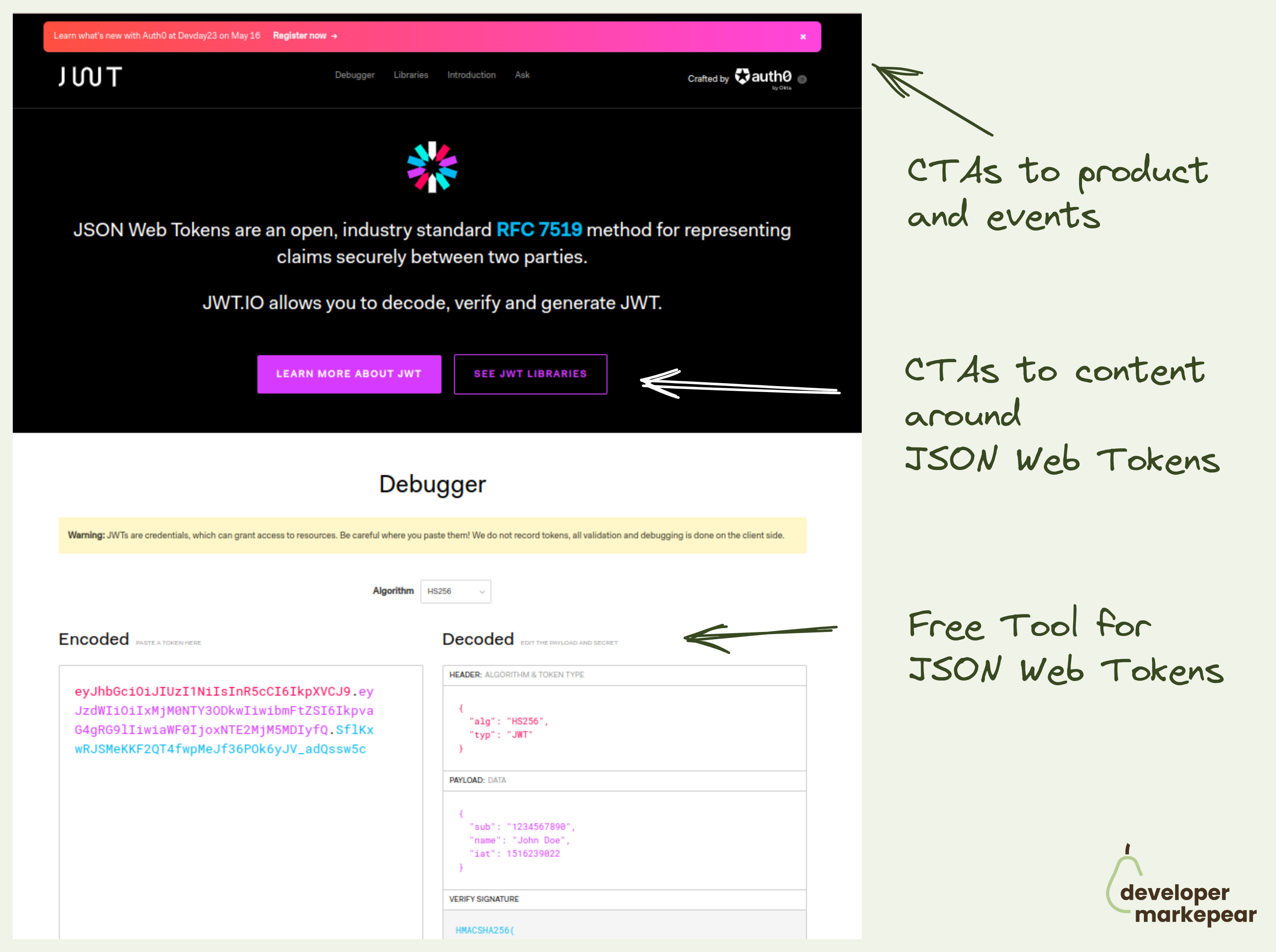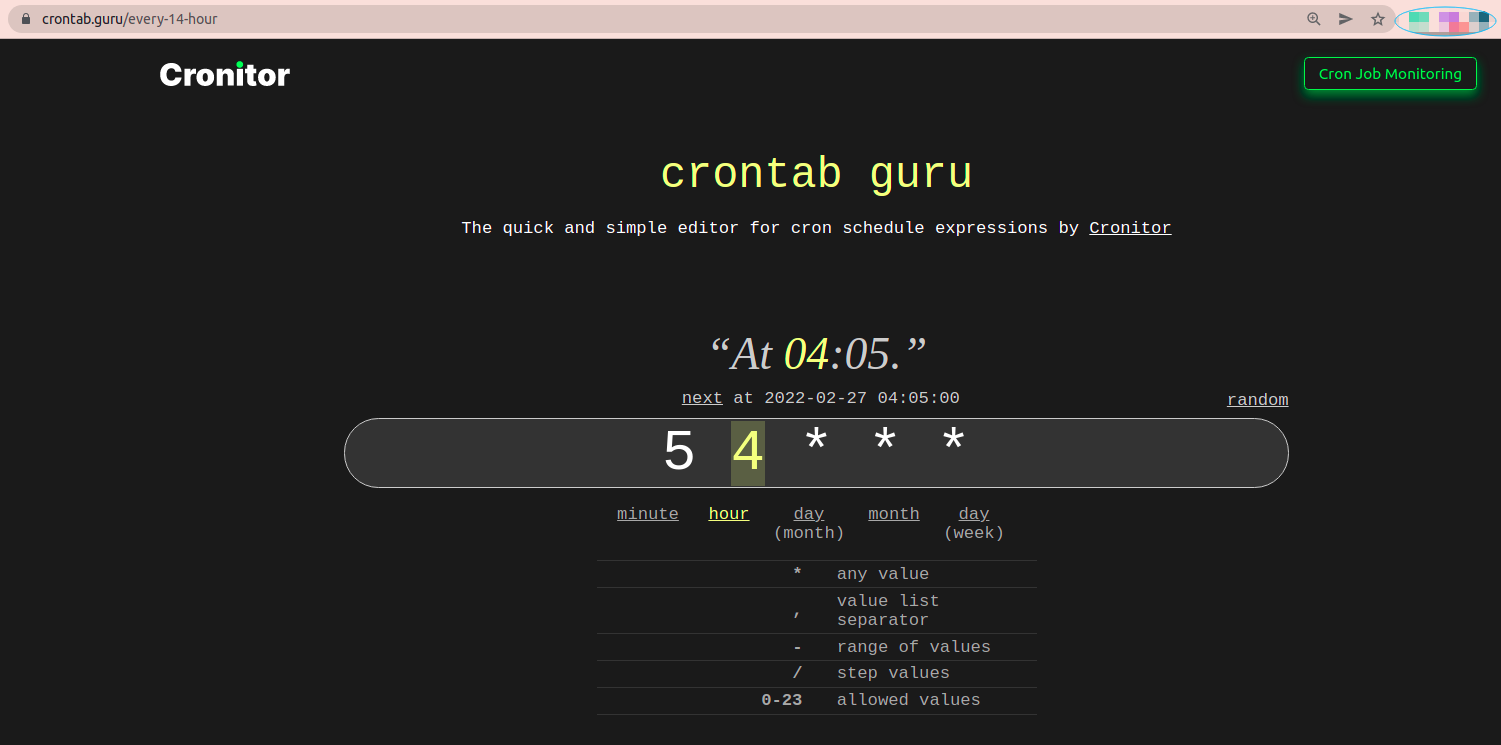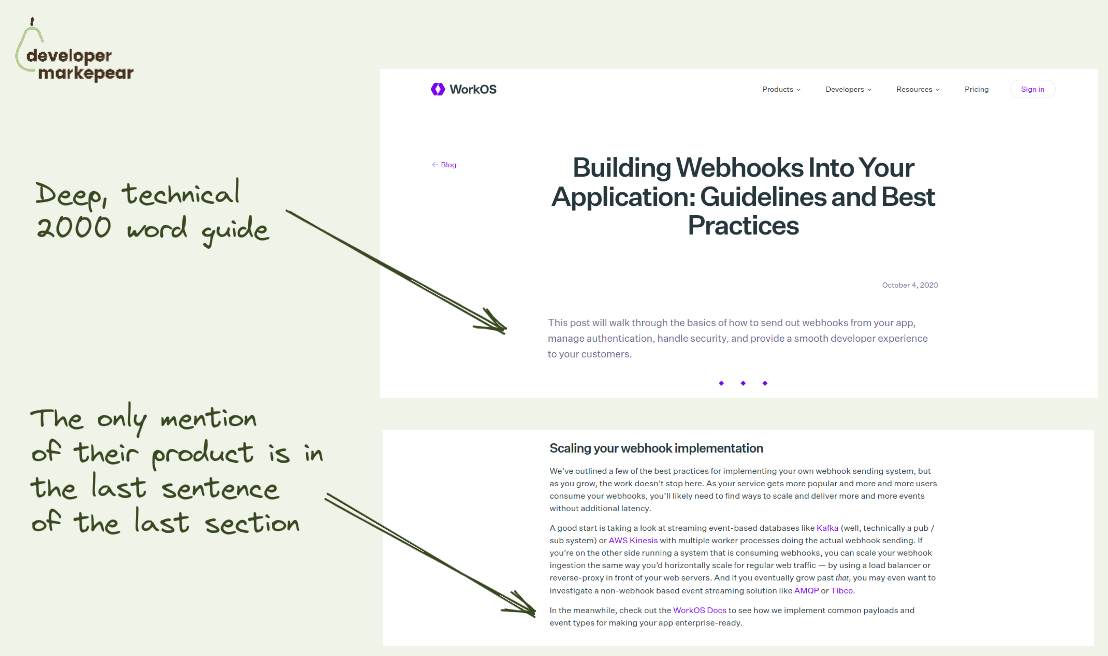
Marketing through free tools is powerful. And Auth0 implemented it beautifully.
In an old article from Gonto I read about some free tools that Auth0 created years ago.
And those tools are still generating traffic and leads today.
And they are helpful to developers and make the Auht0 brand even more appreciated by the community.
One of those tools is JSON Web Token Debugger.
So how this works for them is this:
Now, Gonto suggested that is important to do it on a separate domain to make it less promotional.
I am not sold on that especially when I know there are companies like @VEED.IO that build "SEO tool clusters" in the /tools/ subfolder of their page and crush it in search.
But either way, if you can solve a real problem your target devs have, no matter how small, you should be able to get some developer love (and $) from the value you created.

Great SEO tactic.
What folks from Cronitor did is:
This can be used for many dev-focused tools as by definition they use commands which can be templated.
I've heard about it originally from Harry Dry over at https://marketingexamples.com/seo/cronitor

This is how you write dev tool JTBD blog posts.
Masterclass of writing this type of content from @WorkOS imho.
Deep 2000 word guide that explains how to add webhooks the your application.
Goes into examples, best practices, everything.
One thing it doesn't do?
It doesn't push the product left right and center.
In fact, the only CTA is hidden in the very last sentence of the very last section.
Why?
Because most likely, the reader's intent is around understanding the problem at this point.
They want to understand what adding webhooks to their app really means from the practitioner's standpoint.
And they did that beautifully.
Could you have pushed the product a bit more? Sure.
But by answering the actual questions devs came here for they managed to build trust.
And I am sure got their fair share of click-throughs and signups anyway.

Great example of programmatic SEO from Snyk.
They created a page called snyk advisor.
It is a repository of pages about open-source packages.
Each page is created automatically out of publicly available information.
Enhances it with Snyk-generated security scans and reports.
It builds awareness for other Snyk products in the security space.
A lot of those pages rank high in google for the {package} keyword which is incredible.
And when people land on the package report page the CTAs to Snyk products push conversions.

How to write a "What is {MY CORE KEYWORD}" article that gets to the top of HackerNews? 👇
First of all, almost no one succeeds at that as you write those articles for SEO distribution, not HN distribution.
To get an SEO-first article on HN your content quality bar needs to be super high.
But you can do it.
PlanetScale managed to get their "What is database sharding and how does it work?" on the orange page (kudos to Justin Gage!).
Here is what was interesting about that article:
𝗦𝘂𝗽𝗲𝗿 𝘁𝗼 𝘁𝗵𝗲 𝗽𝗼𝗶𝗻𝘁 𝗶𝗻𝘁𝗿𝗼.
• ❌ No "In today's fast-paced data-driven world enterprises work with data" stuff.
• ✅ Just "Learn what database sharding is, how sharding works, and some common sharding frameworks and tools."
𝗛𝗶𝘁𝘁𝗶𝗻𝗴 𝗸𝗲𝘆𝘄𝗼𝗿𝗱𝘀 𝘄𝗵𝗶𝗹𝗲 𝗯𝘂𝗶𝗹𝗱𝗶𝗻𝗴 𝗿𝗮𝗽𝗽𝗼𝗿𝘁 𝘄𝗶𝘁𝗵 𝘁𝗵𝗲 𝗱𝗲𝘃 𝗿𝗲𝗮𝗱𝗲𝗿.
💚 Speaking peer to peer, not authority-student:
• "You’ve probably seen this table before, about how scaling out helps you take this users table, all stored on a single server:"
• "And turn it into this users table, stored across 2 (or 1,000) servers:"
• "But that’s only one type of sharding (row level, or horizontal). "
𝗨𝘀𝗶𝗻𝗴 𝗷𝗮𝗿𝗴𝗼𝗻 𝗮𝗻𝗱 𝘂𝗻𝗱𝗲𝗿𝘀𝘁𝗮𝗻𝗱𝗶𝗻𝗴 𝘆𝗼𝘂𝗿 𝗮𝘂𝗱𝗶𝗲𝗻𝗰𝗲
Things like:
• "Partitioning has existed – especially in OLAP setups"
• "Sifting through HDFS partitions to find the missing snapshot "
𝗔𝗰𝘁𝘂𝗮𝗹𝗹𝘆 𝗲𝘅𝗽𝗹𝗮𝗶𝗻𝗶𝗻𝗴 𝘁𝗲𝗰𝗵𝗻𝗶𝗰𝗮𝗹𝗹𝘆 𝗵𝗼𝘄 𝘁𝗵𝗶𝗻𝗴𝘀 𝘄𝗼𝗿𝗸
🔥 Look at the section "How database sharding works under the hood" with subsections:
• Sharding schemes and algorithms
• Deciding on what servers to use
• Routing your sharded queries to the right databases
• Planning and executing your migration to a sharded solution
🎁 𝗕𝗼𝗻𝘂𝘀: 𝗽𝗹𝘂𝗴 𝗶𝗻 𝘆𝗼𝘂𝗿 𝗽𝗿𝗼𝗱𝘂𝗰𝘁 𝗴𝗲𝗻𝘁𝗹𝘆
Section "Sharding frameworks and tools" shares open-source tools (every dev, but HN devs in particular like OS projects).
And there as an info box, you have the info that Planetscale comes with one of those OS projects deployed.
Just a beautifully executed piece of content marketing.